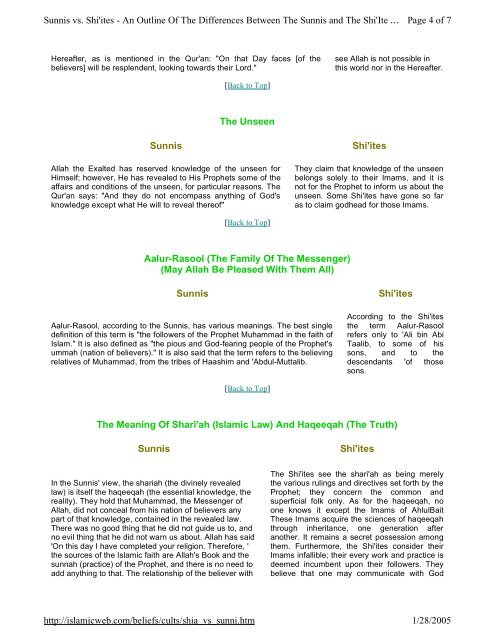Collection Of Articles (Refuting Shia) - Enjoy Islam
Collection Of Articles (Refuting Shia) - Enjoy Islam
Collection Of Articles (Refuting Shia) - Enjoy Islam
Create successful ePaper yourself
Turn your PDF publications into a flip-book with our unique Google optimized e-Paper software.
Sunnis vs. Shi'ites - An Outline <strong>Of</strong> The Differences Between The Sunnis and The Shi'Ite ...<br />
Page 4 of 7<br />
Hereafter, as is mentioned in the Qur'an: "On that Day faces [of the<br />
believers] will be resplendent, looking towards their Lord."<br />
see Allah is not possible in<br />
this world nor in the Hereafter.<br />
[Back to Top]<br />
The Unseen<br />
Sunnis<br />
Allah the Exalted has reserved knowledge of the unseen for<br />
Himself; however, He has revealed to His Prophets some of the<br />
affairs and conditions of the unseen, for particular reasons. The<br />
Qur'an says: "And they do not encompass anything of God's<br />
knowledge except what He will to reveal thereof"<br />
Shi'ites<br />
They claim that knowledge of the unseen<br />
belongs solely to their Imams, and it is<br />
not for the Prophet to inform us about the<br />
unseen. Some Shi'ites have gone so far<br />
as to claim godhead for those Imams.<br />
[Back to Top]<br />
Aalur-Rasool (The Family <strong>Of</strong> The Messenger)<br />
(May Allah Be Pleased With Them All)<br />
Sunnis<br />
Aalur-Rasool, according to the Sunnis, has various meanings. The best single<br />
definition of this term is "the followers of the Prophet Muhammad in the faith of<br />
<strong>Islam</strong>." It is also defined as "the pious and God-fearing people of the Prophet's<br />
ummah (nation of believers)." It is also said that the term refers to the believing<br />
relatives of Muhammad, from the tribes of Haashim and 'Abdul-Muttalib.<br />
Shi'ites<br />
According to the Shi'ites<br />
the term Aalur-Rasool<br />
refers only to 'Ali bin Abi<br />
Taalib, to some of his<br />
sons, and to the<br />
descendants 'of those<br />
sons.<br />
[Back to Top]<br />
The Meaning <strong>Of</strong> Shari'ah (<strong>Islam</strong>ic Law) And Haqeeqah (The Truth)<br />
Sunnis<br />
Shi'ites<br />
In the Sunnis' view, the shariah (the divinely revealed<br />
law) is itself the haqeeqah (the essential knowledge, the<br />
reality). They hold that Muhammad, the Messenger of<br />
Allah, did not conceal from his nation of believers any<br />
part of that knowledge, contained in the revealed law.<br />
There was no good thing that he did not guide us to, and<br />
no evil thing that he did not warn us about. Allah has said<br />
'On this day I have completed your religion. Therefore, '<br />
the sources of the <strong>Islam</strong>ic faith are Allah's Book and the<br />
sunnah (practice) of the Prophet, and there is no need to<br />
add anything to that. The relationship of the believer with<br />
The Shi'ites see the shari'ah as being merely<br />
the various rulings and directives set forth by the<br />
Prophet; they concern the common and<br />
superficial folk only. As for the haqeeqah, no<br />
one knows it except the Imams of AhlulBait<br />
These Imams acquire the sciences of haqeeqah<br />
through inheritance, one generation after<br />
another. It remains a secret possession among<br />
them. Furthermore, the Shi'ites consider their<br />
Imams infallible; their every work and practice is<br />
deemed incumbent upon their followers. They<br />
believe that one may communicate with God<br />
http://islamicweb.com/beliefs/cults/shia_vs_sunni.htm<br />
1/28/2005
















